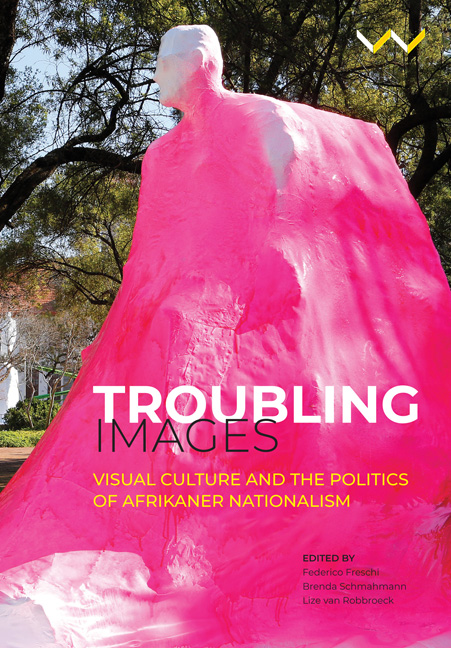Book contents
- Frontmatter
- Contents
- Acknowledgements
- List of Illustrations
- Troubling Images: An Introduction
- 1 The Trajectory and Dynamics of Afrikaner Nationalism in the Twentieth Century: An Overview
- One Assent and Dissent Through Fine Art and Architecture
- Two Sculptures on University Campuses
- Three Photography, Identity and Nationhood
- Four Deploying Mass Media and Popular Visual Culture
- Contributor Biographies
- Index
1 - The Trajectory and Dynamics of Afrikaner Nationalism in the Twentieth Century: An Overview
Published online by Cambridge University Press: 21 March 2020
- Frontmatter
- Contents
- Acknowledgements
- List of Illustrations
- Troubling Images: An Introduction
- 1 The Trajectory and Dynamics of Afrikaner Nationalism in the Twentieth Century: An Overview
- One Assent and Dissent Through Fine Art and Architecture
- Two Sculptures on University Campuses
- Three Photography, Identity and Nationhood
- Four Deploying Mass Media and Popular Visual Culture
- Contributor Biographies
- Index
Summary
This chapter provides a brief overview of key factors that underpinned the emergence of, and shifts within, Afrikaner nationalism. These developments necessarily informed the examples of visual culture explored in subsequent chapters of this volume.
While there can be no question that an ethnic and narrowly defined Afrikaner nationalism profoundly affected the history of twentieth-century South Africa, there has been little agreement among historians as to how this phenomenon should be interpreted. There are divergent interpretations concerning the origins of Afrikaner nationalism, the nature and contents thereof, the way in which it was manufactured, as well as the precise correlation between Afrikaner nationalism and socio-economic developments. Much Afrikaans-language historical writing that deals with this nationalism presents it as an unproblematic concept. Afrikaner nationalism has been naturalised to the extent that it is seen as the inevitable outcome of South African history. The weakness of this approach is that, rather than being interrogated and its complexity unravelled, it is accepted uncritically as a natural given entity. The result is a tautological and essentialist argument with very little explanatory value: Afrikaners are nationalistic because they are Afrikaners.
Liberal, mainly English-speaking historians have been more critical towards Afrikaner nationalism. Ironically, though, their basic point of departure does not differ much from that of their Afrikaner counterparts: they share in analytical terms an unproblematic acceptance of the concept of volk [the people], as well as the notion that nationalism was purely about ideas rather than material considerations. The only substantial difference is that, whereas some English-speaking historians generally denounced nationalism, often in value-laden terms, Afrikaner historians viewed it as a positive phenomenon. The problem here is that, although the outcome may differ, the fundamental point of departure remains the same.
Historiographical advances, however, paid greater attention to the material basis of Afrikaner nationalism that gave rise to intense ideological labour in order to fashion an appropriate cultural and political product. While the precise mix of material, cultural and political factors is a matter of debate, there is, nevertheless, a degree of consensus that these three factors constituted the prime elements of this movement.
- Type
- Chapter
- Information
- Troubling ImagesVisual Culture and the Politics of Afrikaner Nationalism, pp. 23 - 40Publisher: Wits University PressPrint publication year: 2020



